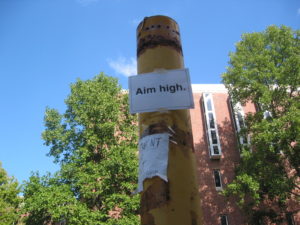
I have been obsessing about this challenge today. This photo, taken by a student in a first-year class that I am co-teaching, captures it well. There’s the goal on a pole, but the pole is rusty and without a top. The conflict I feel is that the efforts I and many others make to “engage” with “community” fall so far short of appropriate responsive-ability (as Meiling Cheng called it in her book, In Other Los Angeleses) that I almost don’t want to aim at all. Meiling meant that reciprocity in relationships–built on trust with some equity of power if not equality–is crucial for partnerships that address key social concerns. The homeless know about being homeless, I do not. The poor know about poverty, I do not. The hungry know about hunger that I can only imagine, and not very well. Compassion and empathy of course matter. Listening matters. But when it comes to action, how do we create a give-and-take that taps into economic and social resources without taking away power from those who must access it to move out of painful, systemically-nurtured situations? How can I be part of the solution and not part of the problem? It takes courage to “aim high” because one so often misses the mark. So many people have no choice but to keep on aiming, despite the high failure rate. Giving up is not an option.

